George A. Schilling (1850 in Baden [1] - 1936) was a prominent American union leader and Georgist in the late nineteenth century. He was also active in Anarchist circles. [2] From 1865 to the 1890s, Schilling worked in Chicago for the Arbeiter Zeitung, a German-language newspaper with socialist (and later, anarchist) leanings. He made his mark in the Chicago labor movement as a member of the cooper's union and a leader of the Knights of Labor. In 1886, he was a prominent supporter of the Labor Party in Illinois. In 1886, the Labor Party endorsed John Altgeld for a judgeship, which Altgeld won. [3]
In 1892, Schilling endorsed Altgeld in a successful race for Governor of Illinois. [4] In 1893, he was appointed by Governor Altgeld as secretary on the State Board of Labor Commissioners, and in 1903 he was appointed by Altgeld to the Chicago Board of Local Improvements. [3]
In 1919 Schilling was a signatory to the call to establish the Committee of 48, a liberal political organization which sought to establish a third party in America between the ideological poles of reaction on the one hand and revolution on the other. [5]

Clarence Seward Darrow was an American lawyer who became famous in the early 20th century for his involvement in the Leopold and Loeb murder trial and the Scopes "Monkey" Trial. He was a leading member of the American Civil Liberties Union, and a prominent advocate for Georgist economic reform.

The Pullman Strike was two interrelated strikes in 1894 that shaped national labor policy in the United States during a period of deep economic depression. First came a strike by the American Railway Union (ARU) against the Pullman factory in Chicago in spring 1894. When it failed the ARU launched a national boycott against all trains that carried Pullman passenger cars. The nationwide railroad boycott that lasted from May 11 to July 20, 1894, was a turning point for US labor law. It pitted the American Railway Union (ARU) against the Pullman Company, the main railroads, the main labor unions, and the federal government of the United States under President Grover Cleveland. The strike and boycott shut down much of the nation's freight and passenger traffic west of Detroit, Michigan. The conflict began in Chicago, on May 11 when nearly 4,000 factory employees of the Pullman Company began a wildcat strike in response to recent reductions in wages. Most of the factory workers who built Pullman cars lived in the "company town" of Pullman just outside of Chicago. It was designed as a model community by its namesake founder and owner George Pullman.

John Peter Altgeld was an American politician and the 20th Governor of Illinois, serving from 1893 until 1897. He was the first Democrat to govern that state since the 1850s. A leading figure of the Progressive movement, Altgeld signed workplace safety and child labor laws, pardoned three of the men convicted in the Haymarket Affair, and rejected calls in 1894 to break up the Pullman strike by force. In 1896 he was a leader of the progressive wing of the Democratic Party, opposing President Grover Cleveland and the conservative Bourbon Democrats. He was defeated for reelection in 1896 in an intensely fought, bitter campaign.
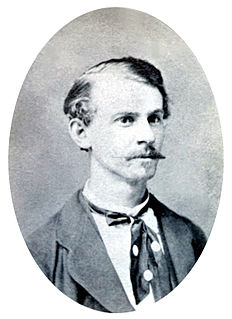
Albert Richard Parsons was a pioneering American socialist and later anarchist newspaper editor, orator, and labor activist. As a teenager, he served in the military force of the Confederate States of America in Texas, during the American Civil War. After the war, he settled in Texas, and became an activist for the rights of former slaves, and later a Republican official during Reconstruction. With his wife Lucy Parsons, he then moved to Chicago in 1873 and worked in newspapers. There he became interested in the rights of workers. In 1884, he began editing The Alarm newspaper. Parsons was one of four Chicago radical leaders controversially convicted of conspiracy and hanged following a bomb attack on police remembered as the Haymarket affair.
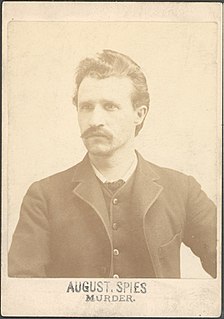
August Vincent Theodore Spies was an American upholsterer, radical labor activist, and newspaper editor. Spies is remembered as one of the anarchists in Chicago who were found guilty of conspiracy to commit murder following a bomb attack on police in an event remembered as the Haymarket affair. Spies was one of four who were executed in the aftermath of this event.

Michael Schwab was a German-American labor organizer and one of the defendants in the Haymarket Square incident.
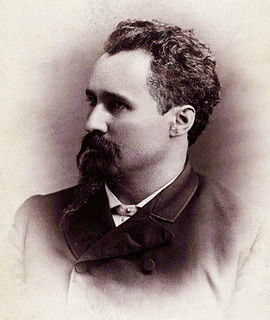
Oscar William Neebe I was an anarchist, labor activist and one of the defendants in the Haymarket bombing trial, and one of the eight activist remembered on May 1, International Workers' Day.
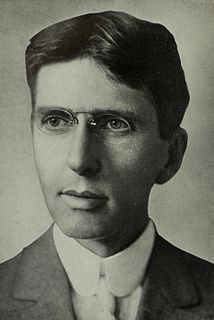
Brand Whitlock was an American journalist, attorney, politician, Georgist, four-time mayor of Toledo, Ohio elected on the Independent ticket; ambassador to Belgium, and author of numerous articles and books, both novels and non-fiction.

The Haymarket affair was the aftermath of a bombing that took place at a labor demonstration on May 4, 1886, at Haymarket Square in Chicago, Illinois, United States. It began as a peaceful rally in support of workers striking for an eight-hour work day, the day after the events at the McCormick Harvesting Machine Company, during which one person was killed and many workers injured. An unknown person threw a dynamite bomb at the police as they acted to disperse the meeting, and the bomb blast and ensuing gunfire resulted in the deaths of seven police officers and at least four civilians; dozens of others were wounded.

Hermann Raster was an American editor, abolitionist, writer, and anti-temperance political boss who served as chief editor and part-owner of the Illinois Staats-Zeitung, a widely circulated newspaper in the German language in the United States, between 1867 and 1891. Together with publisher A.C. Hesing, Raster exerted considerable control over the German vote in the Midwest and forced the Republican Party to formally adopt an anti-prohibition platform in 1872, known as the Raster Resolution. He was appointed as Collector of Internal Revenue for the First District of Illinois by President Ulysses S. Grant but resigned from this post shortly thereafter. Raster returned to Europe in 1890 when his health began to fail him and died filling a minor diplomatic role in Berlin. Today he is best remembered for his extensive correspondence with Western intellectual and political figures of the time, such as Joseph Pulitzer, Elihu Washburne, and Francis Wayland Parker, much of which is preserved at the Newberry Library in Chicago.
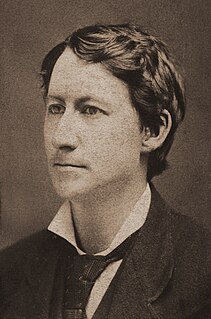
Simon Philip Van Patten (1852–1918), known by his middle name of "Philip," was an American socialist political activist prominent during the latter half of the 1870s and the first half of the 1880s. Van Patten is best remembered for being named the first Corresponding Secretary of the Workingmen's Party of the United States in 1876 and for heading it and its successor organization, the Socialist Labor Party of America, for the next six years. In 1883 Van Patten mysteriously disappeared, with his friends reporting him as a potential suicide to law enforcement authorities. He later turned up as a government employee, however, having abandoned radical politics in favor of stable employment.

Samuel Tellefson "Sam" Hammersmark was an American book publisher, trade union organizer, political activist, and Communist Party functionary. Hammersmark is best remembered as a political lieutenant of William Z. Foster in the Chicago anarcho-syndicalist and communist movements of the 1910s through the 1930s and as a candidate of the Communist Party for public office.

The Socialist Labor Party (SLP) is the first socialist political party in the United States, established in 1876.

Glenn Edward Plumb was an American lawyer who was famous for proposing a radical plan for cooperative railway ownership, the Plumb plan, in 1918. He founded the Plumb Plan League to support the proposal. Despite strong support from organized labor, including railroad workers, miners and farm workers, the plan was not adopted.
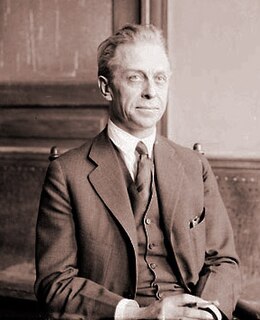
William Bross Lloyd was an American attorney and political activist. The oldest son of the muckraking journalist Henry Demarest Lloyd and Jessie Bross, daughter of Chicago Tribune founder William Bross, William Bross Lloyd is best remembered as a founding member and financial angel of the fledgling Communist Labor Party of America, forerunner of the Communist Party USA.
Boris Yelensky was a Russian anarchist propagandist from the early 20th century. Born in Russia in 1889, he participated in the 1905 Revolution, later migrating to the US, returning to take part in the 1917 Revolution and migrating once more to the US. Once there, he became a prominent figure in the anarchism movement, particularly in the Anarchist Red Cross in Chicago.

In the Chicago mayoral election of 1919, Republican William H. Thompson won reelection, winning a four way race against Democrat Robert Sweitzer, independent candidate Maclay Hoyne, and Cook County Labor Party candidate John Fitzpatrick.
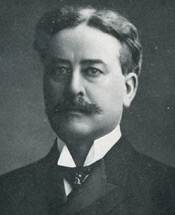
In the Chicago mayoral election of 1897, Democratic nominee Carter Harrison Jr. was elected, winning a majority of the vote and defeating independent Republican John Maynard Harlan, Republican nominee Nathaniel C. Sears, independent Democrat Washington Hesing, as well as several minor candidates. Harrison carried a 26.7 point lead over second-place finisher Harlan, a margin greater than Harlan's vote share itself.

In the Chicago mayoral election of 1899, Democrat Carter Harrison Jr. was reelected, winning a plurality of the vote and defeating Republican candidate Zina R. Carter, former Illinois governor John Peter Altgeld, as well as several minor candidates by a double-digit margin.

The Spring Valley race riot of 1895 was a violent racial conflict between Eastern and Southern European immigrants and African American coal workers in the mining town of Spring Valley, Illinois. The conflict was in response to the robbery and shooting of Italian miner Barney Rollo, who reported that his assailants were five black men. The assault provoked the town's long-standing social and racial unrest, and many white immigrant workers united against the African American miners. During the investigation into the shooting several black miners were temporarily taken into custody for questioning and many white townspeople began to form a mob, demanding that all blacks be fired and removed from Spring Valley. The mine manager refused, which prompted the white miners to violently riot against both the black miners and their families, forcing them to flee to the nearby town of Princeton.